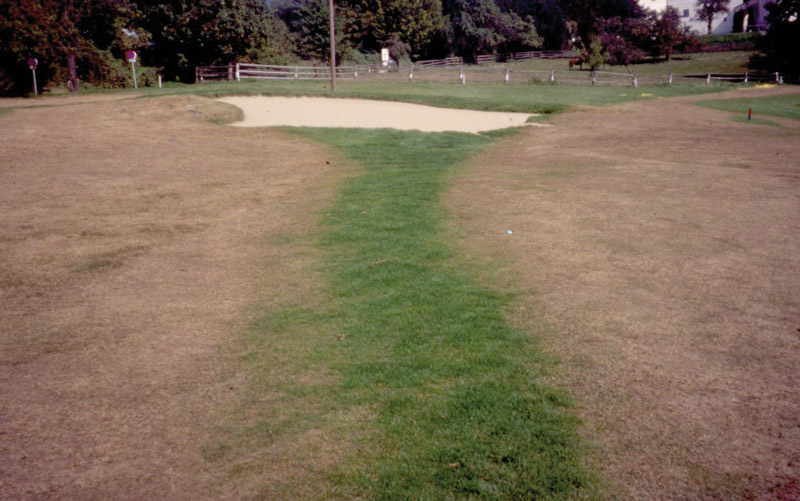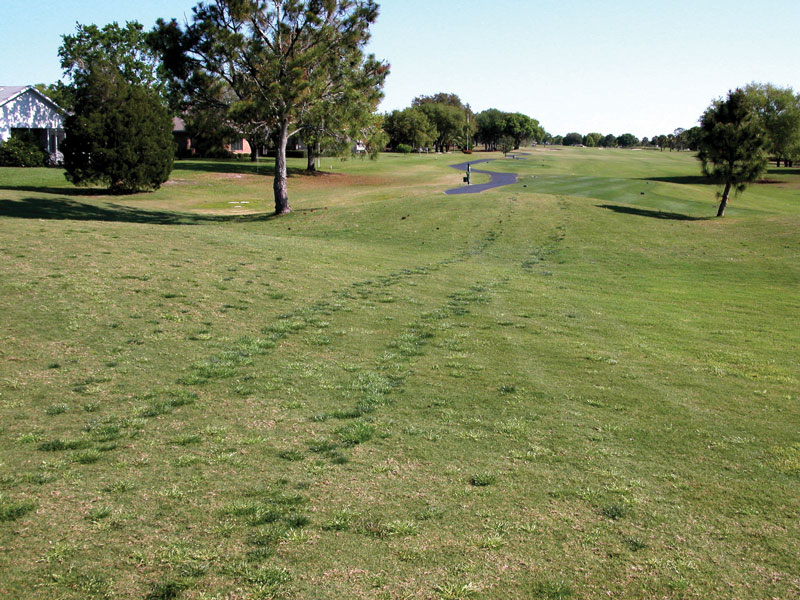GCM’s Photo Quiz is presented in partnership with STEC Equipment.

Problem A: Brown turf with green strip in center

Location: Central Europe
Turfgrass area: 18th fairway
Turfgrass variety: Bluegrass
Problem B: Double lines of ryegrass

Location: Florida
Turfgrass area: Fairway
Turfgrass variety: 419 bermudagrass
Scroll down for answers.
Problem A: Brown turf with green strip in center
This photo dates back to 1994 and was submitted by longtime friend Mel Lucas Jr. The cause of this brown turf with a green strip in the center was glyphosate, and it unfortunately occurred on the 18th fairway leading up to a picturesque 18th-century clubhouse at this course in central Europe.
There were some broadleaf weeds from the tree line to the entrance road and also from the tee to the green. The person in charge of spraying weeds had mixed a half-tank of glyphosate and spot-sprayed the edges of the road, courtyard and golf path by hand. They then put a selective broadleaf weedkiller in the same tank without properly cleaning it out and sprayed with the boom from tee to green and tree to driveway. They missed this one strip between the areas.
The glyphosate was still at a high enough concentration in the tank to kill not only the broadleaf weeds but also the bluegrass. To make matters worse, the clubhouse’s high vantage point showed the damage in an extremely pronounced way.
Photo submitted by Mel Lucas Jr., CGCS Retired, international turfgrass consultant, past president of GCSAA and a 59-year association member.
Problem B: Double lines of ryegrass
The double lines of ryegrass on this 419 bermudagrass rough were caused by a worn-out utility trailer used during winter overseeding of the golf course tees.
The crew on this course overseeded tees with perennial ryegrass in preparation for winter play, and they took diligent care not to get seed off the tee surface during application. However, some seed seems to have spilled out into the trailer they were using for the seeding process. Gaps in the trailer flooring allowed ryegrass seeds to fall through and establish into the semi-dormant bermudagrass. Selective post-emergence herbicides were later used to clean up the renegade ryegrass and Poa annua that had germinated.
Photo submitted by Todd Lowe, technical service manager at Bayer Environmental Science and a 24-year GCSAA member.
Editor’s note: Have a photo of an on-course anomaly? GCM would love to have a look! Email it to Photo Quiz author John Mascaro.
John Mascaro is the president of Turf-Tec International.